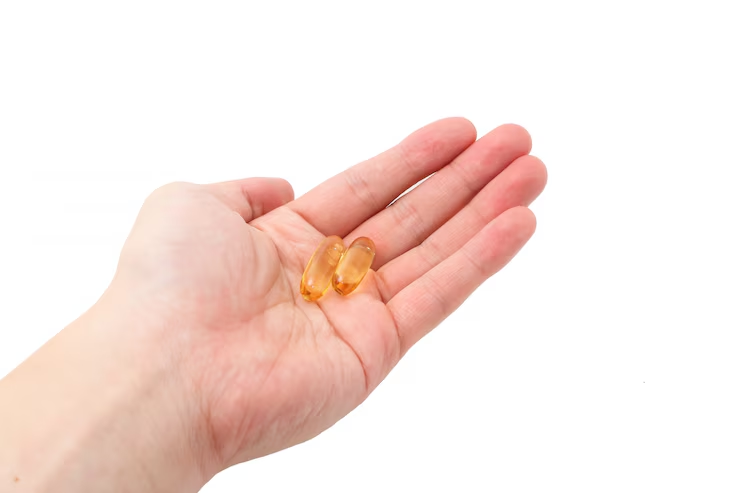









Free Shipping (WM) | Sign Up Biobay Membership for Free 50 Points & Exclusive Benefits
Natural supplements have become a trusted choice for many in pursuit of better health. Among the rising stars are sea buckthorn and fish oil, rich in fatty acids and widely used to support various aspects of wellness. Beyond their popularity, these oils differ in origin, nutritional profile, and how they serve your body. This article explores sea buckthorn vs fish oil to help you make an informed choice based on your unique health needs.
- Sea buckthorn oil is extracted from the berries and seeds of the Hippophae rhamnoides shrub and is rich in Omega-7, antioxidants, and vitamins.
- Fish oil comes from oily fish and is a concentrated source of Omega-3 fatty acids, EPA and DHA, known for supporting heart, brain, and joint health.
- Sea buckthorn oil contains Omega-3, 6, 7, and 9 with strong antioxidant support, while fish oil offers higher levels of EPA and DHA for cardiovascular and cognitive benefits.
- Sea buckthorn oil is suitable for skin hydration, gut health, and immune support, while fish oil is ideal for heart health, brain function, and inflammation.
- Fish oil may cause a fishy aftertaste or allergic reactions, while high doses of sea buckthorn oil can occasionally cause mild digestive discomfort.
- Take with meals for better absorption and consistent results, using softgels or liquid formats as preferred.

Sea buckthorn oil is extracted from the Hippophae rhamnoides shrub, which is native to Europe and Asia. It is unique because it can be sourced from the plant's berries and seeds, each offering a different nutrient profile.
To preserve its nutritional integrity, sea buckthorn oil is typically extracted using methods such as:
- Supercritical CO₂ extraction: retains most bioactive compounds without oxidation.
- Cold-pressing: a chemical-free method that keeps the oil close to its natural state.
- Solvent extraction: less preferred due to potential residue and loss of purity.
The nutritional content of sea buckthorn oil varies depending on its source:
- Berry oil is rich in Omega-7 (palmitoleic acid), carotenoids, Vitamin E, and flavonoids.
- Seed oil contains more Omega-3 (alpha-linolenic acid) and Omega-6 (linoleic acid), as well as phytosterols and tocopherols.
This dual-source nature makes sea buckthorn oil one of the few botanical oils to offer a complete spectrum of essential fatty acids—Omega 3, 6, 7, and 9.
Studies reported in SCRIP Journal highlighted that sea buckthorn oil boosts skin hydration and increases collagen production density by 10% in 12 weeks, making it ideal for skin repair and anti-ageing.
Additionally, studies by Dubey and Shukla (2024) reported a 12% improvement in memory among older adults and a 20% increase in antioxidant activity, supporting brain and immune health.
|
Benefit |
How It Helps |
|
Skin Hydration & Elasticity |
Rich in Omega-7 and antioxidants that support skin repair and moisture retention. |
|
Gut & Mucosal Health |
Soothes mucous membranes, helps with ulcers, dry eyes, and intestinal microbiota lining support. |
|
Cardiovascular Function |
Helps balance cholesterol levels and supports heart health through anti-inflammatory properties. |
|
Immune System Support |
Packed with Vitamin E, carotenoids, and flavonoids that strengthen immune response. |
|
Antioxidant Protection |
Fights free radicals, supporting overall cellular health and reducing oxidative stress. |
Its versatility and vegan-friendly composition make sea buckthorn oil a compelling option for those seeking a plant-based supplement for internal and external health.
Explore the many sea buckthorn benefits that support skin, gut, and immune health.

Fish oil is a widely used dietary supplement derived from the tissues of oily fish such as salmon, mackerel, sardines, and anchovies.
It’s best known for its high concentration of Omega-3 fatty acids, particularly EPA (eicosapentaenoic acid) and DHA (docosahexaenoic acid), which are essential for brain, heart, and overall body function.
To ensure purity and safety, fish oil undergoes various extraction and refinement processes:
- Molecular Distillation: removes heavy metals and toxins like mercury while preserving Omega-3 content.
- Cold-Pressing: gently extracts oil without high heat, retaining natural nutrients.
- Ethyl Ester Conversion: used in some supplements to concentrate EPA and DHA levels; however, natural triglyceride forms tend to offer better bioavailability.
Premium-grade fish oil is typically purified to remove environmental contaminants and is tested for oxidation to ensure freshness.
Fish oil is a rich source of:
- Omega-3 Fatty Acids: especially EPA and DHA, which are directly used by the body.
- Other trace fats: depending on fish species, fish oil may also contain Omega-6 and monounsaturated fat in small amounts.
Thanks to its high concentration of EPA and DHA, fish oil is one of the most researched supplements for supporting long-term physical and mental health.
A 2012 study analysing Malaysian marine fish by Muhamad & Mohamad found that species like Stolephorus baganensis (anchovy) contain high levels of omega-3 fatty acids, with 10.5% EPA and 4.68% DHA, making them excellent local sources of these nutrients.
|
Benefit |
How It Helps |
|
Heart Health |
Lowers triglycerides, stabilises heart rhythm, and supports blood vessel function.
|
|
Brain & Cognitive Function |
DHA supports brain development, memory, and focus, especially in aging populations.
|
|
Eye Health |
DHA is a major component of the retina that helps prevent macular degeneration.
|
|
Anti-Inflammatory Effects |
EPA reduces systemic inflammation linked to joint pain and chronic conditions.
|
|
Mood & Mental Health |
May reduce symptoms of depression and anxiety by improving brain lipid balance.
|
Making an informed supplement choice starts with knowing what each oil brings, based on nutrient composition differences. Each offers unique compounds that target specific areas of health, from skin to heart function.
|
Nutrient/Component |
Sea Buckthorn Oil |
Fish Oil |
|
Omega-3 |
Present (mainly ALA in seed oil; lower amounts overall)
|
High levels of EPA and DHA – more bioavailable and directly usable
|
|
Omega-6 |
Present in moderate amounts (linoleic acid)
|
Present in small amounts
|
|
Omega-7 |
Very high (palmitoleic acid, especially in berry oil)
|
Not present
|
|
Omega-9 |
Present (oleic acid)
|
Present
|
|
Vitamin E |
High antioxidant levels, especially tocopherols and tocotrienols
|
Present, but in smaller amounts
|
|
Vitamin A & D |
Minimal to none
|
Contains Vitamin A and D
|
|
Carotenoids |
Abundant in berry oil (beta-carotene, zeaxanthin, etc.)
|
Trace levels only
|
|
Phytosterols & Flavonoids |
Present (especially in seed oil) – support immune and heart health
|
Not present
|
|
Primary Function Support |
Skin, wound healing, gut lining, immune system, anti-ageing
|
Heart, brain, eyes, inflammation management
|
Enhance your heart, brain, and joint health by learning more about the science-backed omega 3 oil benefits.

Each oil offers unique health benefits. This side-by-side guide helps you identify which supports your specific wellness goals better.
|
Health Goal |
Sea Buckthorn Oil |
Fish Oil |
|
Heart Health |
May support vascular integrity, but less effective for lowering triglycerides.
|
Highly effective due to EPA & DHA, supports cholesterol balance and heart rhythm.
|
|
Brain & Cognitive Function |
Contains some antioxidants, but lacks direct brain-supporting Omega-3s.
|
Rich in DHA, essential for brain development, memory, and focus.
|
|
Eye Health |
Offers carotenoids, which support eye protection, but no DHA.
|
DHA is a core structural component of the retina, supports long-term vision.
|
|
Inflammation & Joint Health |
Contains anti-inflammatory compounds, but not clinically potent.
|
EPA helps reduce chronic inflammation in joints and muscles.
|
|
Skin Hydration & Repair |
Excellent for dry skin, anti-ageing, and skin regeneration (Omega-7 rich).
|
Limited benefit for skin; not a primary use case.
|
|
Gut & Mucosal Support |
Helps soothe and strengthen gut lining and mucous membranes.
|
Less targeted effect on digestive system or mucosal health.
|
|
Immune Support |
Rich in Vitamin E, flavonoids, and carotenoids for immune modulation.
|
Some immune benefits via reduced inflammation, but secondary to other effects.
|

Although both supplements are generally safe for most people, it’s important to consider potential side effects, lifestyle factors, and product quality before adding either to your routine.
|
Factor |
Sea Buckthorn Oil |
Fish Oil |
|
Allergies & Sensitivities |
Rare, but may cause mild digestive upset in high doses.
|
Not suitable for those with fish or seafood allergies.
|
|
Taste & Smell |
Slightly earthy or tangy; usually masked in capsule form.
|
Can have a strong fishy aftertaste; burping is common if taken without food.
|
|
Capsule Size & Format |
Available in small softgels or liquid oil; easier to swallow for some users.
|
Some capsules are large; liquids available but may be less palatable.
|
|
Dosage Caution |
High sea buckthorn oil dosage may cause loose stools or interact with blood-thinning medications.
|
Excessive fish oil dosage can thin blood and may interfere with certain medications.
|
|
Sustainability & Sourcing |
Generally sustainably harvested from wild or cultivated shrubs.
|
Overfishing concerns; opt for third-party certified, sustainably sourced products.
|
|
Storage Needs |
Keep in a cool, dark place to preserve nutrient stability.
|
Prone to oxidation; choose high-quality, sealed packaging and refrigerate if needed.
|

Making the most of your supplement starts with how you use it. The table below breaks down when, how, and with what to take sea buckthorn or fish oil for optimal benefits.
|
Aspect |
Sea Buckthorn Oil |
Fish Oil |
|
Best Time to Take |
Take with meals, ideally with healthy fats to improve absorption of fat-soluble nutrients.
|
Morning or with main meals to minimise aftertaste and maximise absorption.
|
|
Recommended Format |
Available as softgels, liquid oil, or blended in skin and beauty supplements.
|
Commonly sold in softgels or liquid form; also found in high-EPA/DHA blends.
|
|
Combining With Other Supplements |
Can be taken with most vitamins; often paired with collagen or beauty blends.
|
Safe with multivitamins; avoid doubling up on Omega-3s if already taking other sources.
|
|
Who Can Take It |
Suitable for vegetarians and those with fish allergies.
|
Ideal for those focusing on heart, brain, and joint health; not suitable for vegans.
|
|
Daily Consistency |
Best results with daily use over 4–8 weeks.
|
Long-term use supports sustained cardiovascular health and cognitive benefits.
|
Sea buckthorn and fish oil offer powerful health-supporting properties, but their benefits align with different needs.
Sea buckthorn oil shines in areas like skin hydration, mucosal health, and plant-based nutrition, while fish oil remains a go-to for heart, brain, and inflammation support due to its high EPA and DHA content.
The right choice depends on your health goals, dietary preferences, and how your body responds to each type of oil. For some, combining both in moderation may offer well-rounded support.
Visit Biobay’s official website to learn more about our healthcare products in Malaysia—crafted with care and backed by nature.
